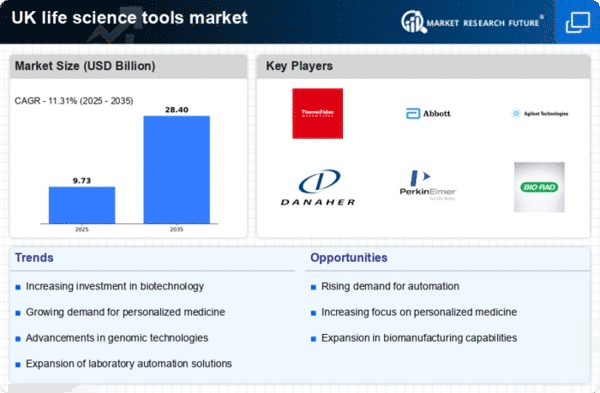Growing Focus on Biobanking
The life science-tools market is increasingly influenced by the growing focus on biobanking, which plays a pivotal role in supporting research and development in various fields, including genomics and personalized medicine. In the UK, the biobanking sector is projected to expand significantly, with an estimated market value of £1.2 billion by 2025. This growth is driven by the increasing need for high-quality biological samples for research purposes. As biobanks expand their collections and improve sample management technologies, the life science-tools market is likely to see a corresponding rise in demand for tools that facilitate sample processing, storage, and analysis.
Emphasis on Regulatory Compliance
Regulatory compliance is becoming increasingly important in the life science-tools market, as companies must navigate complex regulations to ensure product safety and efficacy. In the UK, the Medicines and Healthcare products Regulatory Agency (MHRA) plays a crucial role in overseeing the approval of life science tools. As regulatory frameworks evolve, companies are investing in compliance solutions to streamline their processes and reduce time to market. This emphasis on regulatory compliance not only enhances product credibility but also drives innovation within the life science-tools market, as firms seek to develop tools that meet stringent regulatory standards while addressing the needs of healthcare providers.
Rising Demand for Diagnostic Tools
The life science-tools market is experiencing a notable increase in demand for diagnostic tools, driven by the growing emphasis on early disease detection and personalized treatment plans. In the UK, the market for diagnostic tools is projected to reach approximately £2.5 billion by 2026, reflecting a compound annual growth rate (CAGR) of around 6.5%. This surge is largely attributed to advancements in molecular diagnostics and the integration of artificial intelligence in diagnostic processes. As healthcare providers seek to enhance patient outcomes, the life science-tools market is likely to benefit from innovations that improve accuracy and speed in diagnostics, thereby fostering a more proactive approach to healthcare.
Investment in Research and Development
Investment in research and development (R&D) within the life science-tools market is a critical driver, as companies strive to innovate and enhance their product offerings. In the UK, R&D expenditure in the life sciences sector has been on an upward trajectory, with estimates suggesting that it could exceed £5 billion annually by 2025. This investment is essential for developing cutting-edge tools that meet the evolving needs of researchers and clinicians. Furthermore, collaboration between academic institutions and industry players is likely to accelerate the pace of innovation, ensuring that the life science-tools market remains competitive and responsive to emerging scientific challenges.
Expansion of Academic and Clinical Research
The expansion of academic and clinical research in the UK is a significant driver of growth in the life science-tools market. With increased funding for research initiatives and a focus on translational medicine, the demand for advanced tools and technologies is likely to rise. The UK government has committed substantial resources to support research, with funding levels reaching approximately £1.4 billion in 2025. This investment is expected to foster collaboration between academia and industry, leading to the development of innovative life science tools that enhance research capabilities and improve patient care outcomes.
















